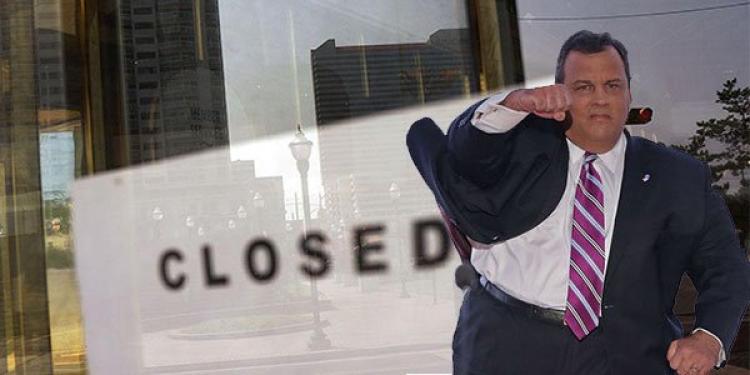Christie’s Atlantic City Blues
Posted: February 18, 2015
Updated: October 6, 2017

Governor Christie is finding support of his U.S. republican presidential bid due to the growing economic crisis in New Jersey caused by the decline of Atlantic City
New Jersey Governor Chris Christie is contemplating he should put his hat in the ring for the U.S Republican presidential nomination in 2016. Rutgers Eagleton poll recently placed his personal favorability rating at 37 percent. Unfortunately this new low is the direct result of continuing trials and tribulations occurring in Atlantic City. With decimated casino environment, dealt within the confines of US gambling laws, toppled with high crime, all eyes and fingers are pointing at Christie as the culprit.
• New Jersey Governor Christie is considering the U.S. Presidency
• Opponents blame Christie for Atlantic Cities woes
• Christie appointed a new manager for the boardwalk
• Casinos property tax contributions dropped significantly
Despite the negative connotations, there are many who believe that Atlantic City’s woes are not Christie’s fault. Brigid Harrison, political science and law professor at Montclair State University says that “the problem of Atlantic City is not all Chris Christie’s fault, as the gaming industry has been eviscerated. But why Atlantic City matters for him running for president is that South Jersey has lost 10,000 jobs, and that kind of drain means other statewide economic indicators are dropping, and his primary opponents can very easily use those against him.”
Political Opponents Circle Christie
Wealthy donors in the New York and New Jersey area fell that Atlantic City’s continuing slump had pushed them to back up other presidential contenders out fear that Christie will bring about a smear campaign of negatives ads relating to his economic policies in New Jersey. Dan Schnur, a former McCain aide during his 2000 presidential run and Executive director at University of Southern California’s Institute of Politics said that “the opponents’ campaign can make pretty nasty TV commercials with pictures of the ‘meaner streets of Atlantic City.’”
The decaying state of boardwalk forced Christie to decide to appoint Kevin Lavin as emergency manager of Atlantic City. As a result, Democratic New Jersey senator Stephen Sweeney said he would begin a “big fight” against the decision. The ratings agencies lowered the city’s credit rating and proclaimed Lavin as a negative precedent for all of the state’s municipalities. Other high official were denouncing the idea of an outside manager just weeks before the Lavin’s appointment.

No matter how ravenous Christie’s critics are, some can see more objectively. Michael DuHaime, top political advisor for Christie and manager at Mercury Public Affairs, mentioned the pitiful numbers held by New Jersey before Christie took office. With unemployment at 9.7% when Christie took office, clearly New Jersey was just another casualty in the National Economic crisis. “I think you have to look at where New Jersey started. New Jersey was economically a wreck; Christie inherited an absolute mess,’ Du Haime said.
Blaming It On the Boardwalk
The trouble with Atlantic City started long ago when Pennslyvania legalized gambling in 2004 causing the city to lose its grip on east coast casino dominance. Causing serious commotion in US gambling news, the Keystone State took away a fair share of Atlantic City’s vacation and tourism revenue. From 2006 to 2013, casino revenues on the boardwalk fell from $4.9 to $2.9 billion due to casino competition. Recently, New York announced plans to open three casinos and New Jersey may open a new casino in the Meadowlands this summer.

Tracy Gordon, a senior fellow at the Urban Institute’s Tax Policy Center said that “Atlantic City’s economy is all built on gaming, and when that industry goes away, when a competitor opens in your backyard, that can be devastating to the local economy as well as property taxes.” In 2014, Atlantic City earned more than 81% of its cash from property taxes. At one point, Casino’s provided 75% of property taxes to the city and now may soon fall below 50% according to Michael Stinson, director of revenue and finance for Atlantic City.
Casino’s putting in less property tax will subsequently result in high property taxes for citizens. Gordon MacInnes, President of New Jersey Policy Perspective said “one thing people surviving in Atlantic City on $30,000, $40,000 a year don’t need is a rise in property taxes by hundreds of dollars.” The Rutgers Economic Advisory Service predicted in December that casino closings will cost the state 11,000 direct jobs. Even though four casinos closed last year, the New Jersey unemployment rate of 6.2% is still above the national average.











